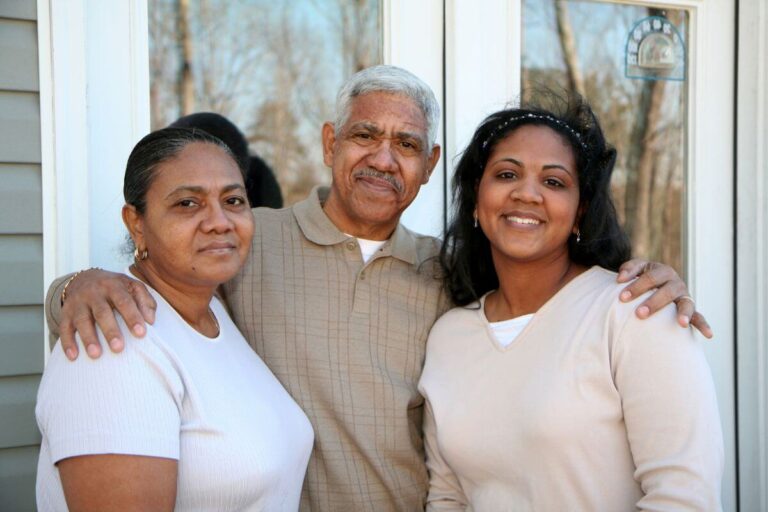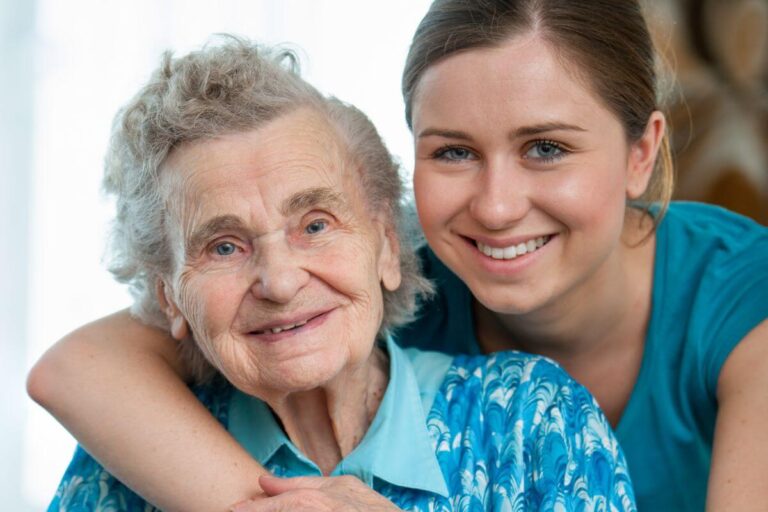What To Do When an Elderly Parent Can’t Walk
As our parents age, we often need to help them make difficult decisions about their health and safety challenges. One of the most challenging issues can be when our parents are no longer able to walk.
This may happen for a variety of reasons, ranging from arthritis to muscle weakness to strokes and spinal cord injuries.
When this happens, we will want to do everything possible to help them maintain their independence and quality of life. However, it’s also vitally important to do so with compassion and patience. We want to avoid unnecessary conflicts, right?
It will be helpful for you to be prepared and knowledgeable about options, interventions, and supports for your parent when the time comes.
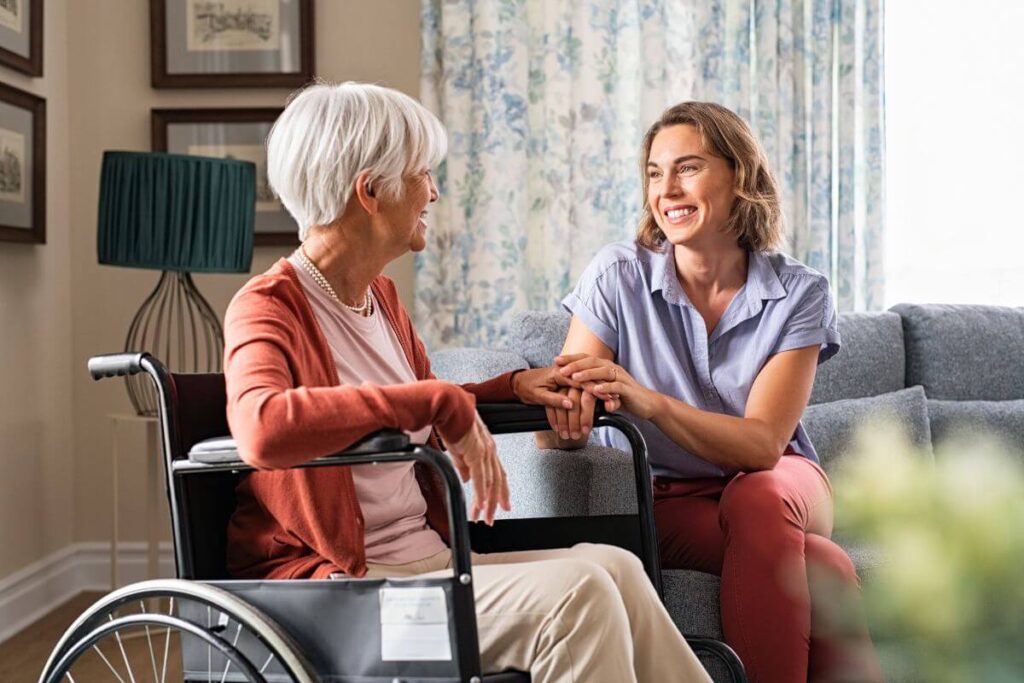
In this article, we will explore the steps you can take when your elderly parent can no longer walk, including medical evaluations, at-home care, specialized transportation options, and more.
By taking these steps and being prepared, you can help ensure that your parent receives the care and support they need to continue living their best life.
Related Article: A Comprehensive Caring for Aging Parents Checklist
What Causes an Elderly Person Not to be Able to Walk?
There are several factors that can cause an elderly person not to be able to walk. These are some of the most common causes:
- Arthritis: Unfortunately, this is a condition I have a lot of experience with since my mother had rheumatoid arthritis. Arthritis is a common condition found in aging adults that affects the joints, causing pain, stiffness, and inflammation. The condition can make it difficult for you to walk since it often affects the knees, hips, and other joints.
- Osteoporosis: Osteoporosis is a condition in which the bones become weak and brittle, making them more susceptible to fractures. If an elderly person has osteoporosis, they may be at an increased risk of falls and fractures, which can make it difficult for them to walk. This is a very common condition in the elderly.
- Stroke: Again, I have personal experience with this condition because my grandmother had frequent strokes. There are many different symptoms of strokes, depending on the severity and location. A stroke occurs when blood flow to the brain is disrupted, causing damage to brain cells. When a person has a stroke, they may experience weakness or paralysis on one side of their body, making it difficult for them to walk. They may also have difficulty with communication, balance, vision, and more. American Stroke Association is an excellent resource for stroke symptoms.
- Parkinson’s Disease: Parkinson’s disease is a neurological disorder that affects movement. You may have heard of it and seen the affects with the Canadian-American Actor, Michael J. Fox. He was diagnosed with it at the height of his career 30+ years ago. It can cause stiffness, tremors, and difficulty with balance and coordination, making it difficult for a person to walk.
- Muscle Weakness: Muscle weakness can be caused by a variety of factors, such as aging, inactivity, or other medical conditions. If an elderly person’s muscles are weak, they may have difficulty walking or may be more prone to falls.
- Peripheral Neuropathy: This is another condition I am all too familiar with because family members have suffered from it. Peripheral neuropathy is when the nerves that carry information to and from the brain and spinal cord to the rest of the body are damaged. There are a number of reasons this can happen and it can be difficult to treat. This can cause pain, numbness, and weakness in the legs, making it difficult for an elderly person to walk.
- Hip Fracture: This is a common situation among the elderly population. A hip fracture can occur as a result of a fall or other trauma. When an elderly person has a hip fracture, they are usually immobilized and subsequently non-weight bearing on the affected leg. Naturally, this is a long and difficult recovery process that requires support and patience. My grandmother suffered terribly after having a hip fracture from a fall.
- Spinal Cord Injury: A spinal cord injury can cause paralysis or weakness in the legs, making it difficult for an elderly person to walk. Depending on the severity of the injury, they may require a wheelchair or other mobility aids. Spinal stenosis can also cause problems with the legs.
These are just some of the conditions that can cause your elderly parent to be unable to walk. You should be alert to any mobility changes as you observe them over time so you are prepared to help.
In fact, data suggests that mobility disabilities have been the most common disability among older adults since 2016 and it is now even considered an epidemic of immobility in the United States.
If you are concerned about your elderly parent’s mobility, it’s important to speak with their doctor to obtain an evaluation of their condition and determine the cause of their difficulty walking. From there, a treatment plan can be developed with the professionals and the family to help improve their mobility and quality of life.

Can the Elderly Regain Mobility?
If your elderly parent is no longer able to walk, it can be a difficult and emotional experience for everyone in the family. However, there are steps you can take to ensure their safety and comfort, as well as maintain their quality of life. In most cases, the elderly can regain at least some mobility over time and with assistance.
First, you will need to consult medical experts to determine the cause of your elderly parent’s situation, what interventions and supports can help them regain mobility, and how you can help.
I’ve shared detailed information below to help you navigate this situation. Remember to be compassionate and patient. Your parent is going through a difficult time.
Related Article: 79 Uplifting Quotes About Caring for Elderly Parents
Schedule a Medical Evaluation
Again, I cannot emphasize this enough. If your parent can no longer walk, it’s important to schedule a medical evaluation to determine the underlying cause of their mobility issues. Without a proper evaluation, it can be difficult to know how to help your parent or what treatment options may be available to them.
By speaking with their doctor and getting a proper diagnosis, you can help your parent receive the appropriate care they need to improve their mobility and quality of life.
Additionally, a medical evaluation can help identify any potential safety concerns and provide guidance about how to prevent falls and other accidents that may occur due to mobility issues. The doctor will assess upper body strength and lower body strength.
I’ve also found that a clear diagnosis from a specialist or geriatric doctor will help elderly patients get Medicare assistance quicker.
Assess Their Mobility Needs
With an accurate diagnosis and evaluation, their doctor can help you determine what kind of assistance they need to move around, such as a wheelchair, walker, or cane. There are many solutions for limited mobility in elderly people.
You’ll need to consider the layout of their home and make modifications as needed, such as installing grab bars in the bathroom, removing obstacles from hallways, and ensuring there is adequate lighting. Remove throw rugs and furniture with sharp corners. Look carefully for potential hazards that you can modify or remove for their safety.
You may also want to consider hiring a caregiver to help with daily tasks and provide companionship. Moving around the home may still be challenging even with modifications and supports.
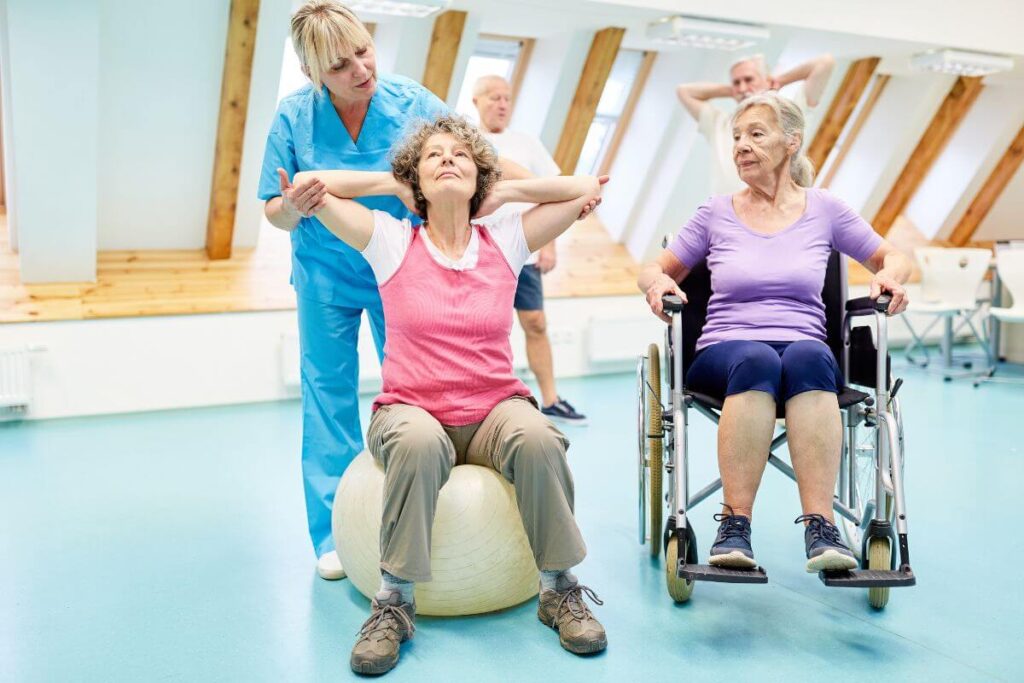
Explore Mobility Aids
There are a variety of mobility aids available that can help your elderly parent maintain their independence and mobility. These include wheelchairs, scooters, walkers, canes, and stairlifts. There are also devices to help elderly or immobile people get out of bed.
Speak to your parent’s doctor or physical therapist to determine which type of mobility device would be most helpful and best suited to their needs. Once you have chosen appropriate mobility aids, make sure to properly train your parent and any caregivers about how to use them safely and comfortably.
I’ve found that an adjustable bed frame often proves very helpful for the elderly to get proper rest during the night and assist in getting in and out of bed. A bedside toilet may be beneficial, as well.
Provide Exercise and Physical Therapy
Even if your parent is unable to walk, it’s important for them to maintain physical activity to the best of their abilities. Be sure to speak to their doctor or physical therapist about exercises they can do to strengthen their muscles, improve balance, and increase flexibility. A lack of movement will only make their situation worse.
Physical therapy services can also be a valuable resource for helping your parent adapt to their new mobility needs and learn how to use their mobility aids effectively. Your doctor should be able to write orders for Physical Therapy and Occupational Therapy to come into the home to help your parent adjust to their new circumstances.
Consider Home Modifications
In addition to mobility aids, there may be modifications you can make to your parent’s home to improve their accessibility and safety. These may include installing ramps, widening doorways, and lowering countertops.
You can consult with a contractor, or even an occupational therapist, who specializes in home modifications to determine what changes are possible and would be most beneficial for your parent’s needs. You may need to also simplify routines and activities around the home to make it possible for your parent to be as independent as possible.
As my father approached this 90th birthday, we noticed some safety issues that needed to be addressed. As a result, we made many modifications around his house such as decluttering, minimalizing, installing extra grab bars, and moving furniture around for easier navigation.
Explore Assistive Technology
There are a variety of assistive technologies available that can help your parent maintain their independence and safety. These may include smart home devices that can be controlled by voice commands, such as Amazon Alexa or Google Home.
Other technologies may include medical alert systems, medication reminders, and fall detection devices. Speak to your parent’s doctor or a geriatric care manager to determine which technologies would be helpful for your parent’s safety and health needs.
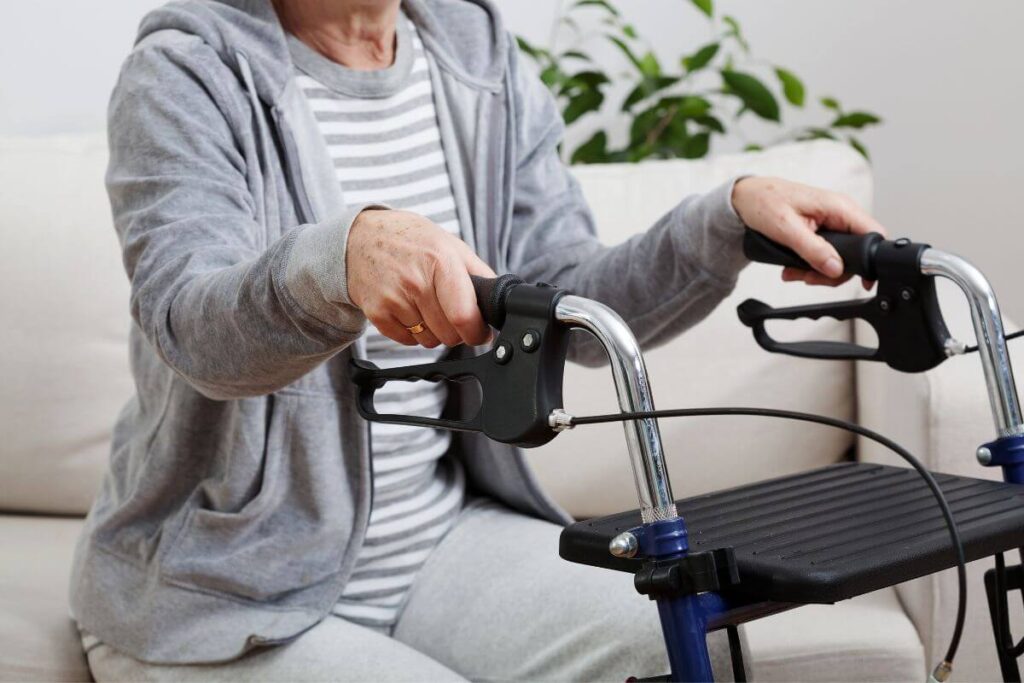
Ensure Social Support
When your elderly parent can no longer walk, they will most likely feel isolated and lonely. You and other family members should ensure that they have adequate social support. It’s important to visit them regularly, but you should also encourage them to take the initiative to stay in touch with friends and family. Consider enrolling your parent in social activities at their local senior center or community center, too.
Incredibly, my 90-year old father continues to stay in phone contact with three friends who graduated from high school with him in 1951. It’s amazing to listen to their conversations; they have so many wonderful memories of friends and places and fun times! They used to get together once a month for lunch but that is no longer possible as you might imagine.
You may also want to consider hiring a caregiver or companion to provide them with regular companionship. A support group for your parent would be helpful, as well. Getting together with others who are experiencing a problem with walking will help raise their confidence and provide a sense of community.
Bring in At-Home Care
Bringing in home care services can be a helpful solution for an elderly parent who is unable to walk. At-home care providers can help with activities of daily living, such as bathing, dressing, and using the bathroom. They can also help with mobility and provide assistance with transfers, such as getting in and out of bed or a wheelchair.
Senior care services can also help family caregivers understand how to lift someone who can’t walk and how to help elderly loved ones in a manner that is safe for everyone. If any form of dementia is involved, they can also help with dementia care.
Additionally, at-home care providers can help monitor your parent’s condition, provide medication reminders, and offer companionship to help combat feelings of isolation and loneliness. By bringing in at-home care, you can ensure that your parent is receiving the care and support they need to maintain their independence and quality of life.
You should be aware that choosing the right in-home service and caregivers can take time and effort. You should plan to interview staff and meet with them over a period of time to determine if they are a good match for your family. Everyone should be comfortable with the care that is being provided and some services do a better job than others.
Arrange Transportation
Arranging special transportation for immobile elderly parents may be necessary for several reasons. It can help ensure their safety when traveling to and from medical appointments or other destinations. Regular public transportation may not be equipped to handle their special mobility needs, and they may be at risk for falls or other accidents if they attempt to travel on their own.
Special transportation, such as wheelchair-accessible vans or medical transport services, can provide a safe and comfortable way for immobile elderly parents to get around. Additionally, special transportation can help prevent social isolation and allow them to participate in community activities or visit friends and family. Many communities offer this kind of service.
By arranging special transportation, you can help your elderly parent maintain their independence and improve their overall quality of life.
Related Article: 9 Key Benefits of Living with Elderly Parents
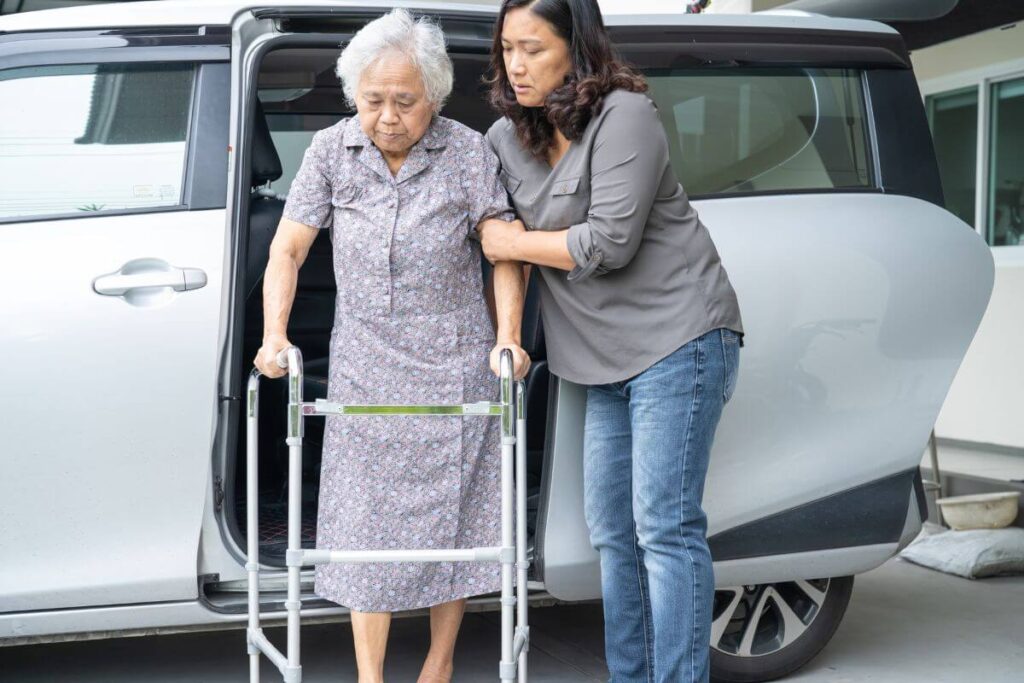
Final Thoughts: What To Do When Elderly Parent Can’t Walk
When your elderly parent can no longer walk, it can be a difficult and emotional experience for everyone. However, as outlined above, there are steps you can take to ensure their safety and comfort, as well as maintain their quality of life.
By working closely with their doctors and therapists, you can develop a plan that will help your parent adapt to their new mobility needs and maintain their independence and dignity. Remember, their safety is just one aspect of this situation — there are many other important things to consider. They are likely very emotionally fragile regardless of how they appear to be handling the situation.
I hope the information outlined above provides you with insightful and helpful information to make this life transition a little smoother for everyone. Remember to take good care of yourself while also preserving your relationship with your parent and showing them compassion. I know this is a difficult situation for everyone — I’ve experienced it several times — you are not alone.
Just in case you need further support, you may want to read “When Aging Parents Expect Too Much: A Survival Guide.” As our parents age, they can become somewhat demanding and selfish — but there are many valid reasons why this happens. You can learn more here to help you cope.
Love to ALL! ~ Susan


